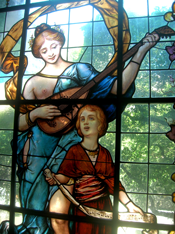The edifices hosting these performances
have succumbed to the ravages of time long since, though documents and
scores relating to operatic life in Rio from this period are still to
be found in local libraries.
The early years of the Republic (established by a military revolt
which sent the Imperial family into exile, as a reaction against the
abolition of slavery in 1888) saw an intense effort to modernize the
capital. The population had been growing considerably as a result of
the exodus of the freed slaves from the coffee plantations of the
state of Rio, who went to the capital in search of better economic
opportunities. They were joined by immigrants from abroad,
particularly from Portugal and Italy.
The first decade of the 20th century saw a number of large scale
efforts for modernization in Rio. These included improvements to the
infrastructure of the port (which would have 3.5 kilometers of docks),
the construction of broad avenues, particularly the Avenida Central
(now known as Avenida Rio Branco), and the consequent demolition of
large numbers of tenements in the center of the city. The opening of
Avenida Central would make possible the construction of an imposing
complex of public buildings in the area now known as Cinelandia,
including the National School for the Fine Arts (now the National
Museum for the Fine Arts), the National Library, and the Theatro
Municipal, modeled after the Paris Opéra, and built sparing no
expense, with the finest materials imported from Europe.
Rio's tropical location, and the extensive wetlands by the bay, had
negative implications for public health, with regular outbreaks of
yellow fever (transmitted by mosquitoes), bubonic plague (transmitted
by rates), smallpox, and tuberculosis. President Rodrigues Alves
(president, 1903-1906) entrusted to Dr. Oswaldo Cruz, who had studied
at the Pasteur Institute in Paris, the task of dealing with these
problems. He began with campaigns to kill mosquitoes and exterminate
rats. In 1904, with Rio facing an epidemic of smallpox, Cruz proposed
obligatory vaccination, and it was approved by the government. Unlike
his previous campaigns, this one met widespread and often violent
resistance by a frightened population, known as the Vaccine Revolt,
and finally obligatory vaccination was suspended. Today, his work is
revered in Rio, with an avenue in the South Zone, and a suburb in the
North Zone, and the Oswaldo Cruz Foundation for public health all
bearing his name.
Silvio Barbato's opera The Scientist is not so much a music drama as
a tableau vivant presenting representative scenes from the life of
this great Brazilian. Act I, Scene I reveals Cruz meditating alone on
his mission as doctor. Later he is joined by his wife Emilia and
friend Salles Guerra, and they sing (in French) of his departure for
Paris. Scene II presents Lapa, a center of bohemian life and
prostitution at the time. Scene III shows a religious procession
asking for relief from the plague.
Act II is notably less static and more dramatic. In Scene I, the
President, Rodrigues Alves, sings of the necessity of vaccination,
with mocking responses from a sort of Greek chorus, seated on stage.
In Scene II we see the effects of the revolt on the Cruz family. Scene
III presents a group of capoeiristas (capoeira is a Brazilian martial
art) in the favela of Providencia. The opera closes in Scene IV with
Cruz, alone once more, walking upstage into the ocean.
One might think that a country famed worldwide for the quality of its
televised dramas might likewise produce stageworthy sung dramas for
the opera house. The static quality of the libretto, choosing to
represent a life, rather than an episode in the life, is the chief
problem. Barbato's music mixes a restrained modernism (most effective
in the solo-chorus exchanges between President Rodrigues Alves and his
critics) with pastiches of Brazilian popular genres (it must be noted
that even if they were less artistically ambitious, they were warmly
welcomed by the audience, especially the capoeira). The least
effective moment for the work was the tedious on-stage solo saxophone
in Act I, Scene II, in which the orchestra is not heard for what seems
like an eternity (and worse, before it re-enters, the sax is joined on
the scene by an accordion). The excellent chorus of the Theatro
Municipal is generally heard offstage, muffling its impact, and
causing problems with its coordination with the orchestra.
Of the singers, those making the most impact were bass Sebastião
Teixeira as Cruz, and the excellent baritone Lício Bruno as Rodrigues
Alves (he had turned in a stellar Papageno earlier in the season). The
scenery and lighting were modern and effective (including
projections), and with the blue fabric waves of the ocean in the
closing scene making a memorable impression.
Tom Moore
